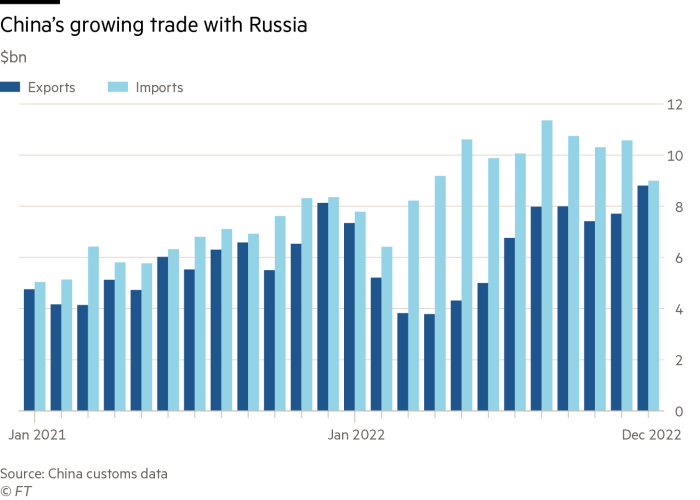China has called for a cease-fire in the war in Ukraine and a return to negotiations as Beijing tries to position itself as peacemaker in the conflict on the first anniversary of Russia’s all-out invasion.
However, Western leaders immediately questioned China’s motives, accusing Beijing of having already taken Russia’s side in the war.
On Friday, China’s Foreign Ministry released a 12-point paper outlining its position on a “political settlement” of the war, though many of the measures echoed Beijing’s previous talking points.
Chinese diplomats have engaged in a difficult balancing act over the war, seeking to appear neutral despite close ties between Beijing and Moscow while also blaming Washington and NATO for provoking the conflict.
“Dialogue and negotiation are the only viable solution to the Ukrainian crisis,” the Foreign Ministry said in the document, which it did not directly describe as war. “All efforts leading to a peaceful settlement of the crisis must be encouraged and supported.”
The heads of NATO and the European Commission said the proposal was marred by Beijing’s failure to condemn the Russian invasion.
“We will look at the principles, of course, but we will look at them against the background of China taking one side,” said Ursula von der Leyen, the chair of the Commission. “It is not a peace plan.”
“China does not have much credibility because it was not able to condemn the illegal invasion of Ukraine,” said Jens Stoltenberg, Secretary General of NATO.
But German President Frank-Walter Steinmeier said: “We very much welcome any constructive proposal that brings us closer to a just and just peace.” He called on Beijing to communicate with Kiev and Moscow.
It is also unlikely that Beijing’s cease-fire plan will gain support in Kiev until Russia withdraws from occupied territories, an issue not addressed in the 12-point position paper.
Zhanna Leshinska, chargé d’affaires at Ukraine’s embassy in Beijing, has ruled out a ceasefire that would freeze the conflict along the current front line.
“We have seen that Russia should unconditionally withdraw all its forces from the territory of Ukraine,” she told reporters in Beijing on Friday, adding that that meant the country’s internationally recognized borders, which included Crimea.
Leschinska said China should show its neutrality by pushing Russia to withdraw its forces and increase its engagement with Ukraine. Chinese leader Xi Jinping has not contacted Ukrainian President Volodymyr Zelensky since the Russian invasion, but he has spoken with Russian President Vladimir Putin several times.

Shi Yinhong, a professor at Renmin University, said Beijing may have known that neither side would heed her proposal. China feels [it] It is necessary to reiterate its neutrality on the war at this point to salvage some international leverage by not only criticizing NATO but also by distinguishing itself from Russia’s behaviour.
And Wang Yi, China’s top diplomat, appeared to make little progress pushing the proposals on Wednesday when he met Putin.
The Beijing paper also warned against the use of nuclear weapons in war and called for the protection of Ukrainian nuclear power plants. He also demanded the cessation of sanctions that were not authorized by the UN Security Council, referring to the sanctions imposed by Western countries.
The peace proposal follows allegations from Washington that Beijing is considering sending lethal weapons and other aid to Russia. A year into the conflict, neither side has had the upper hand in a series of bloody skirmishes in eastern Ukraine, prompting calls among some Chinese nationalists for increased aid to Russia.
Stoltenberg said there were “indications and indications that China may be planning and considering providing military aid to Russia” but there is no evidence that it has done so yet.
Wang Wenbin, a spokesperson for China’s foreign ministry, said Beijing “has always taken a responsible and cautious approach to military exports and does not offer any arms deals in any conflict zones or to parties involved in war. What we have been doing is promoting peace talks.”
Hu Xijin, former editor of the nationalist Chinese newspaper Global Times, defended Beijing’s reluctance to provide direct military aid.
Hu said this week that China has already provided the “biggest support for a crippled Russian economy” by increasing energy and food imports and keeping the flow of Chinese “electronics, cars and microprocessors”.
Chinese customs data shows that imports from its neighbor rose 43 percent last year to $114 billion as it increased purchases of Russian oil, gas and coal, while exports rose 13 percent to $76 billion.
Additional reporting by Maiky Ding and Nian Liu in Beijing

“Subtly charming student. Pop culture junkie. Creator. Amateur music specialist. Beer fanatic.”
